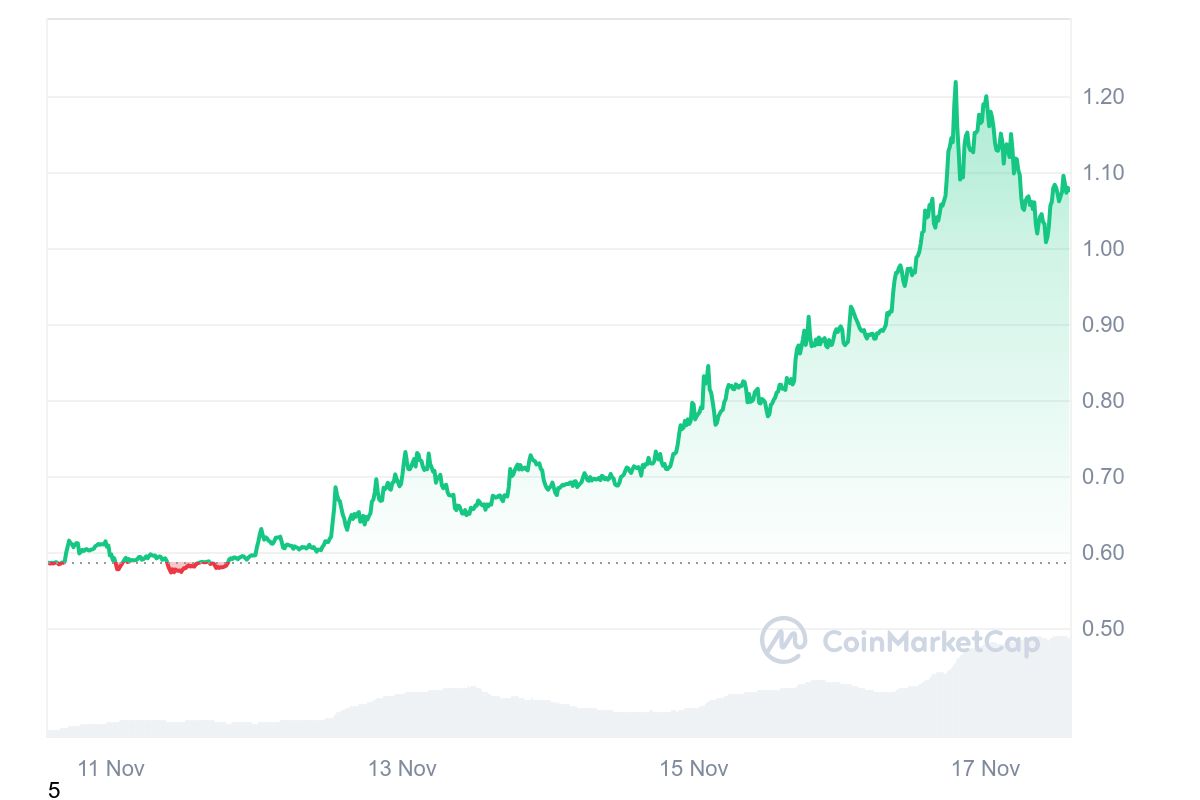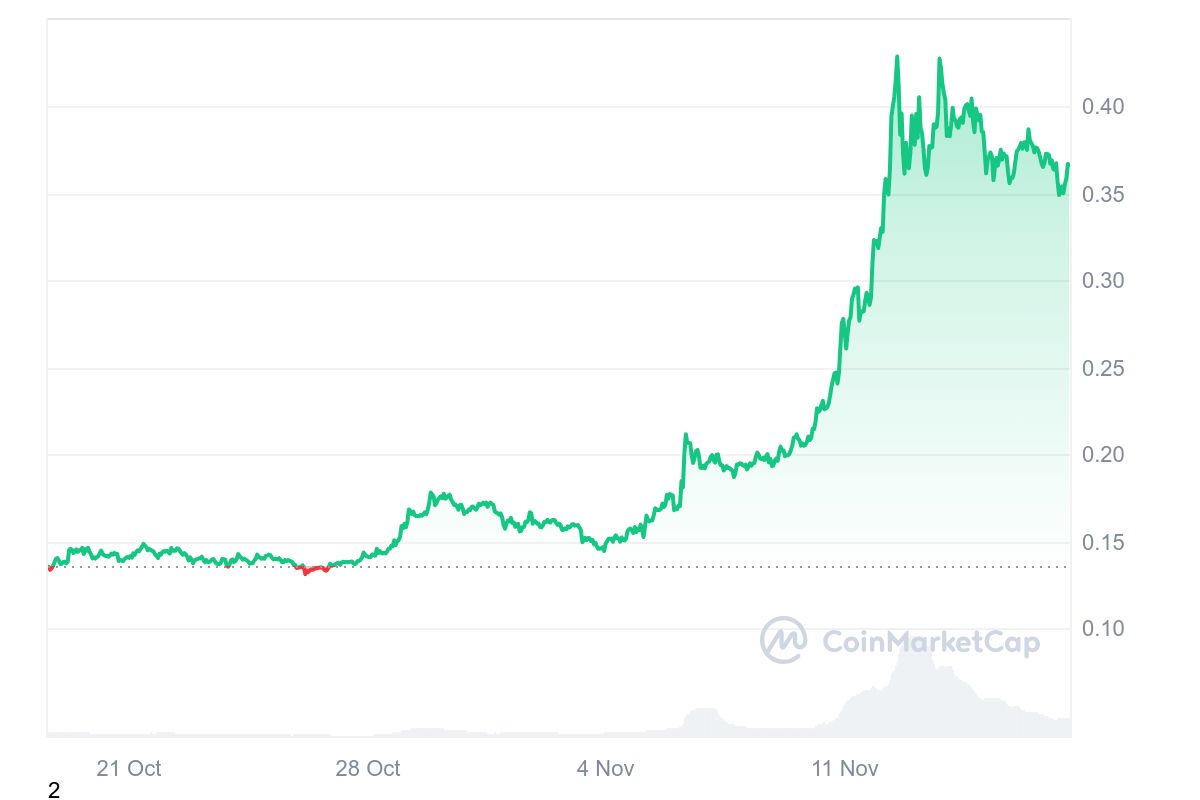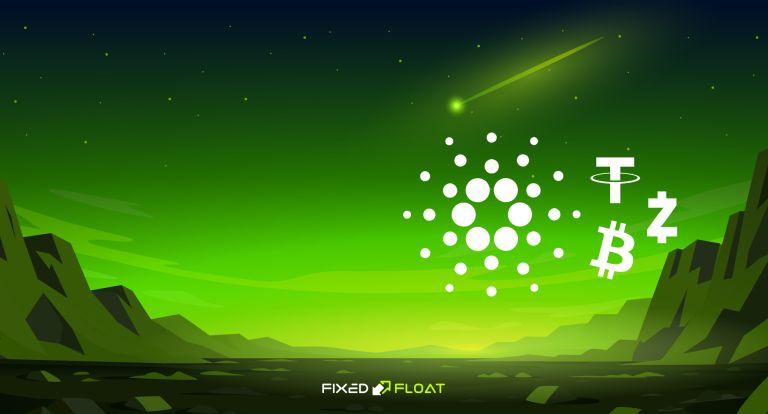Bitcoin Above $93000
On November 13, BTC showed a sudden and impressive growth, helped by the US inflation data, which was completely in line with market forecasts. The cryptocurrency, often called digital gold, confidently crossed the $90,000 mark and reached $93,000. However, despite this rapid growth, analysts warn against a possible correction in the near future.
.jpeg)
XRP Rate Exceeds $1 for First Time in Three Years
On Saturday, November 16, the price of the XRP token surpassed the important psychological mark of $1, which was the first such event since December 2021. At the time of writing, XRP is trading at $1.08, marking an impressive increase of 83.8% in just the last week. The asset is particularly sensitive to rumors about the possible resignation of Gary Gensler as head of the SEC, which is directly related to the long-running legal standoff between Ripple and the regulator.

Dogecoin Renews Three-Year High
This week, the most popular meme coin, Dogecoin, has skyrocketed from $0.20 to an all-time high of $0.43, bringing its market cap to a whopping $63.1 billion. The previous all-time high was $0.33 in April 2021.

At the time of writing, Dogecoin is trading at $0.37 and is the sixth-largest cryptocurrency by market capitalization, with a market cap of $56.9 billion.
Dogecoin's extraordinary growth is linked to political events, namely Donald Trump's success in the US presidential election, as well as the possible role of Elon Musk, one of the cryptocurrency's main supporters, in the new government.
Buterin Speaks at Devcon 2024
Ethereum co-founder Vitalik Buterin spoke at the Devcon 2024 conference in Bangkok, Thailand, where he discussed the progress and prospects of the second-largest cryptocurrency. At the beginning of his speech, Buterin emphasized the stable development of Ethereum since its launch in 2015.
Vitalik paid special attention to the network's transition to Proof-of-Stake (PoS), noting that this has significantly increased the decentralization of the blockchain. To illustrate his words, he showed diagrams comparing the concentration of mining pools in the Proof-of-Work era and current validators.
According to Buterin, Ethereum is currently the most decentralized network, and no other platform has reached this level. He also emphasized that now anyone can become a staker, launch their own node and contribute to the blockchain - this does not require super-powerful equipment. Users can unite in small pools, creating communities for joint participation.
For the First Time in 14 Years, an Address Moved $180 Million in BTC
A wallet that had been dormant for 14 years suddenly transferred 2,000 BTC, worth more than $180 million at the time, to a new address. This incident has attracted the attention of analysts. According to experts, the BTC were mined by the user back in 2010, when he started mining. During all these years, the coins were not used. According to CoinDesk, the wallet received the assets when the BTC rate was only $0.06. Thus, the owner was able to turn an investment of $120 into a staggering $180 million in 14 years.
Trader Loses $25.8 Million Due to Wrong Address
A user with the nickname qklpjeth fell victim to a bug, losing access to 7912 ezETH, which at the time of writing corresponds to a sum of about $25.8 million, by sending tokens to the wrong address.
As the victim explained, on June 19, he accidentally copied the wrong address and sent his ezETH to a smart contract that does not support withdrawals. In search of a solution, he turned to Renzo developers who could update the code and unlock the tokens, but they were powerless, citing "regulatory restrictions".
On November 10, the user again turned to the crypto community for help, offering 10% of the amount (approximately $2.5 million) as a reward for the return of funds.
One of the participants in the discussion linked the incident to the shortcomings of the ERC-20 standard, which have remained unnoticed since 2017. He noted that in the case of regular ETH transactions, the error would have been immediately detected, but this mechanism does not work for tokens.










